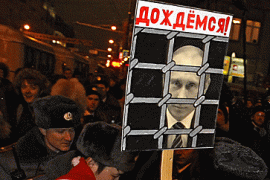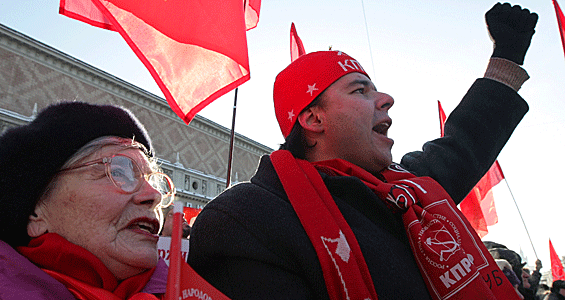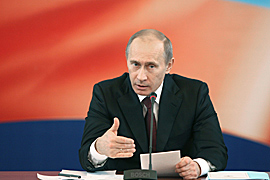Kremlin warily watches Kaliningrad
Mass protests planned in Russian exclave seen as test for leadership in Moscow.

 |
| Anti-government protests have been sparked by the economic downturn [EPA] |
In the latest sign of growing unrest in the country, opposition and human rights activists across Russia are preparing to stage the Day of Wrath protests against higher utility prices, unemployment and lower living standards.
In the past few months, the Russian leadership has been cautiously watching events unfold in Kaliningrad, a Russian exclave of a million people sandwiched in between Poland and Lithuania.
On January 30, anti-government protests attracted more than 10,000 people – the country’s largest demonstration of its kind in a decade.
Gathering on Kaliningrad’s main square, protesters called for Vladimir Putin, the prime minister, and the regional governor Georgy Boos to resign.
The day after the Kaliningrad rally, smaller protests were held in the capital Moscow where police broke up a peaceful demonstration and arrested 100 people.
Similar protests were also held in St Petersburg, Ekaterinberg, Krasnoyarsk and Vladivostock.
Rallies against the government have more recently been held in the Siberian city of Irkustk, and Samara in the Urals.
Protests against the Russian government and even Putin are nothing new, but the scale of events in Kaliningrad appears to have caught the Kremlin off guard.
Demonstrators say they are now getting ready for more protests.
Unemployment
According to Nikolai Volgin, the president of the National Assembly of Labour and Social Policy Specialists, as many as 1.5 million more people could lose their jobs this year.
Russia has approximately eight million people unemployed, and by the summer the total could be nearer to 9.5 million; that is an unemployment rate of 12-12.5 per cent.
The EU average is between six to eight per cent.
But unemployment is not the only problem.
Official figures fail to take into consideration people forced to work part-time and others paid irregularly by businesses hit hard by a slump in sales.
In 2009, the government allocated billions to regional governments to ease the problem but as those funds rapidly dry up, businesses are left with little choice but to make cut-backs.
The government’s insistence that Russia has seen the worst of the economic crisis has failed to convince the masses in Kaliningrad. People are outraged by an increase in taxes, transport and utility prices and a significant drop in living standards.
Opposition groups say that high unemployment has been made worse by Putin’s anti-crisis measures designed to protect Russia’s domestic car industry.
High tariffs were levied on foreign car imports to help bankrupt companies Avtovaz and Lada survive the crisis, but the measures have crippled those who depend on foreign car imports to survive.
For years, Kaliningrad has watched its post-Soviet neighbours, Poland and Lithuania, gain EU membership and become wealthier.
It has never been able to match this level of prosperity much to the growing frustration of the region’s people.
Large coalition
 |
| Protesters in Kaliningrad are calling on Putin to resign his post [AFP] |
According to opposition leaders, January’s demonstration comprised a large coalition of political parties including the communists, liberal and far-right groups, and local residents.
Russians have in recent years shied away from public protests favouring instead heated discussions in the privacy of their own kitchens, but the demonstration in Kaliningrad set a new precedent.
The region’s authorities are less used to handling protests than “Big Russia”, meaning demonstrators were somewhat surprised to find themselves able to march into the city centre unopposed.
Buoyed by that success, rally organisers decided there and then to hold another even bigger demonstration on March 20.
State response
The response to nationwide protests has been somewhat muted.
Dmitry Medvedev, the Russian president, sent a special representative to investigate the situation in Kaliningrad; but to the dismay of many Grigory Boos remains governor.
Instead, Oleg Matveychev, a Kremlin adviser for the region, resigned under public pressure.
Boos responded to demands to break up the political monopoly of Putin’s United Russia party in the regional assembly by promising to lower taxes and create jobs.
Few in Kaliningrad know whether to believe him.
Fractured opposition
The governor has also been involved in intense talks with opposition groups, even offering the protesters two football stadiums on the outskirts of the city to host their March 20 demo, but protesters fear they are being lured into a trap.
Alexey Shabunin, an opposition journalist, told Al Jazeera that the movement is worried about “government provocations”.
This is a view shared by opposition member Solomon Ginzberg who was quoted as saying that “the government is preparing to make an example out of us [and] beat the protesting mood out off the people”.
Growing concerns about how the authorities will respond to fresh demonstrations has prompted the opposition coalition to cancel formal protests on March 20.
The region’s communists have already said they would quit the alliance of opposition groups in response to the decision to cancel the demonstration.
However, remaining protesters say are planning to go ahead with an unsanctioned demonstration in central Kaliningrad.
How the authorities will respond will no doubt will be seen as a litmus test for other anti-government movements nationwide.
Few however believe the authorities will be as “accommodating” as they were in January.
As economic conditions continue to lead to plummeting wages, increased unemployment and inflation, more Russians are choosing to express their discontent in public and challenge the authorities head on.
It remains to be seen whether such discontent in a country with a dubious democratic record could produce a truly vocal opposition that will scrutinise the authority of a political system dominated by Putin’s United Russia party.
On the other hand, the Russian leadership could decide that the country is not quite ready for democracy of this kind and nip the opposition in the bud before they have a chance to bloom.
The answer partially awaits Russia on March 20.